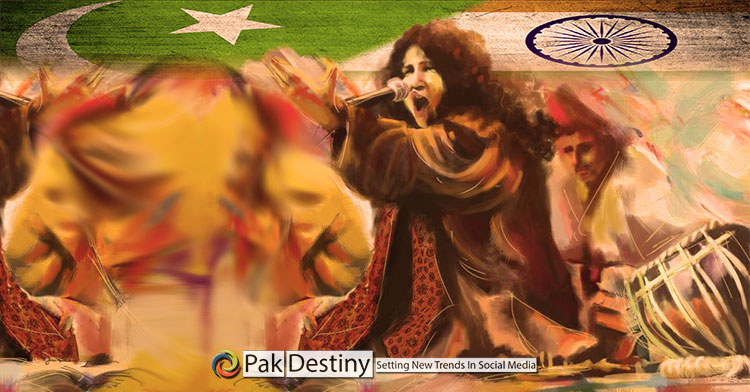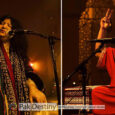
By Sarvat Hossein
“Andhi Chali to Naqsh-e-Kaf-e-Pa Nahi Mila”, written by the great Urdu poet Mustafa Zaidi, was the first ghazal Abida Parveen sang.
The living legend and Queen of Sufi Mystic singing, started her journey in music from the tender age of three, and first performed at the age of six. She is certainly one of the foremost exponents of Sufi music, and is considered one of the finest Sufi vocalists of the modern era.
Abida Parveen was the only child of her parents. Born in a Sindhi Spiritual musical family 67 years ago, she was trained by her father Ustad Ghulam Haider, a famous singer and music teacher, who also plays the Pump organ, Keyboard and Sitar.
Abida has an amazing persona on the stage during her live singing performances. She appeared in a very distinctive style of clothing , a long simple frock buttoned up to her neck, covered with a coat along with an Ajarak (a sindhi dupatta). According to Parveen, her Ajarak came from a darga (Mausoleum). Her popularity placed her in the 500 Most Influential Muslims of the world, with the power to induce hysteria in her audience. She is a “Global Mystic Sufi Ambassador”.
The greatest mystic singers sing mainly ghazala, thumri, khyal, qawwali, raga, sufi rock etc. The songs purify the human soul. The human becomes so involved and lost in this world that he has forgotten God instead. The songs bring us nearer to God, near the Almighty, so that the human soul becomes purified and satisfied.
Abida draws her audiences near to God not only by spreading his messages of love but by trying to induce WAJD, the state of spiritual ecstasy which ‘precedes’ revelation.
The Statute of Humbleness is considered a female counterpart to the genre’s spiritual and vocal golden boy of his time, the late Nusrat Fateh Ali Khan, best known to the Western world through several albums on Peter Gabriel’s Realworld Labels.
Parveen’s career was launched when she sang before 12,000 devotees at Saint Ur’s (death anniversary) in 1981. The great poet sufi saint, Shah Abdul Latif Bhittai, a composer who blended folk music and classical raga in a style known Kafi, was Parveen’s inspiration.
Certainly, she is a sufi super star, a giant of a world music and she has an arresting presence. During her childhood, she visited different shrines with her father. Once, she articulated that every shrine has a distintive culture, every sufi saint has a disparate culture and one learns through spirituality as well…The true culture of sufis is all about spreading peace. This culture is coming from the prophet (PBUH) and this then travels through the sufi saints and is spread throughout the world.”
Her live performances are magical and extraterrestrial. On stage, she is a magnificent projection of calmness but the shows often end up a wild, sweaty and ecstatic mess. She has confessed to hallucinating while deep in performance. But assuredly, her audience acquires from her that hallucinatory state, together with the vibes during the concert and they appreciate those ethereal moments greatly.
Once she disclosed that: “My culture – our culture – is rich in spirituality and love”, she says: “sufism is not a switch, the music is not the show – it is all of life, it is religion. If I want to be recognised for anything, it’s the journey of the voice. And that voice is God’s.”
She often displays her devotion to Ahl al-Bayt (the holy family of prophet Muhammad PBUH). During her applauses, she has often replied that MERA KUCH NAHI SUB MOLA KA HAI ( I don’t have anything, everything belongs to mola).
Recently, she was interviewed by a journalist after the recording of her new song TU JHOOM, with the collaboration of Naseebo Lal. The super spiritual saintly soul displayed great affection and humbleness during the reception to the other singer Naseebo Lal in the Coke Stadium before the recording. A journalist asked her that ‘’why do you meet Naseebo Lal with such humility on set’’? she replied that she acquired that humility from the door of Imam Fazal Al Abbas (AS) who was an Imam and prophet of loyalty. And this is a gift of that door.
Abida Parveen, the most celebrated legend, says that every concert is ‘a first concert’ for her. The music is everything for her, if you abandon music, music will do the same to you. “So I always pray that I may receive, and once the divine listens to that, He creates a gathering where I become a channel, and then that flows to everyone who is interested. So that gathering becomes a spreading of the message.”
She said: ” Once you are in this space, this spirituality actually liberates you, you are not tied to any worldly or materialistic thing.” And this is actually happened in each and every concert of Abida Parveen. It is absolutely amusing and great entertainment to see the public getting liberated from all their worldly worries and becoming completely indulged in the trance of her music.
Parveen is a true vehicle on stage for passion. Her unique singing style and talent transcends any gender expectations in the country as she is adored and loved just as much as her peers, such as the late Nusrat Fateh Ali Khan.
She is an ambassador of the heart and honour of Pakistan. Abida Parveen is appreciated universally and has collaborated with many musicians all over the world. The BBC described her voice as the ‘beautiful voice of the world’.
Sarvat Hossein – A British-Pakistani Freelance Journalist



Excellent article written on this legend and pride of Pakistan, thoroughly enjoyed each and every line written about the great Abidaparween especially the paragraph in which the writer explained her love fr ahlebayt ,indeed she is under their shadow and blessing.
Amazing tribute to saintly soul Abida Parveen.
a young journalist from UK showing tremendous interest for Pakistani sufism is truly appreciatable. The article covers all important aspects of Abuda Parveen’s life. well done Sarvat Hossein and keep it up
‘Doondo gy Agar Mulkon Mulkon
Millay kay nahein Nayyab hein hum’
The great Sufi Kalam Narrator ,Singer…ABIDA PERVEEN.
She started her Sufiistic journey from a Sharine and due to Abid’s voice charisma, the purity of” Kalam ” ,”Adaigi” she had hundreds of thousands of music lovers and researchers following her, all over the world.
The UK based young auther of this article indicates that not even in Pakistan, 3rd Generation of UK likes Abida Perveen.The information and its presentation of the article definately shows excellant research work. It comes from dedication and interest in the subject. i.e Sufisam , purity of nature and mismarising voice of Abida Perveen.
The purity of Kalam , massage and Sufi vocalist have captured the international community, research of the auther is one of the examples.
Good work.